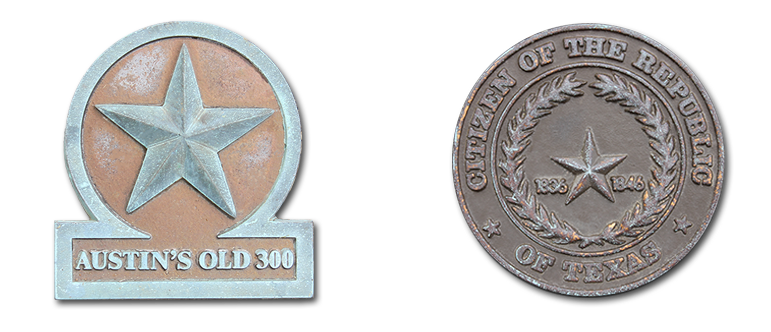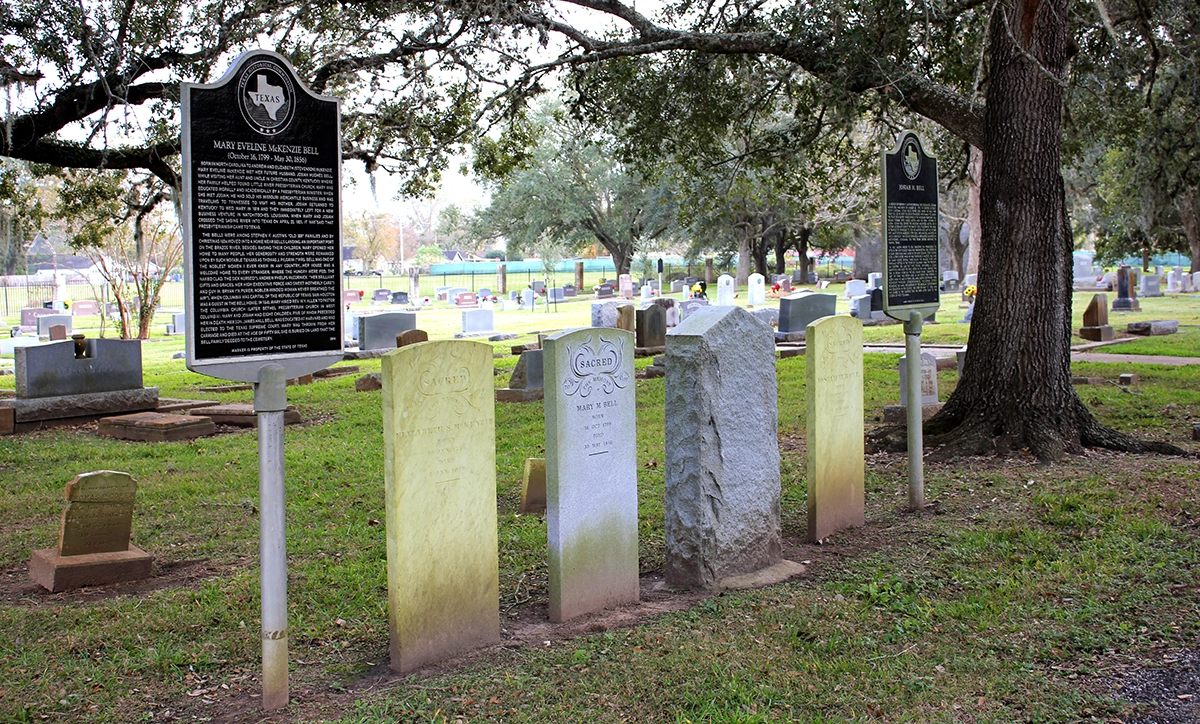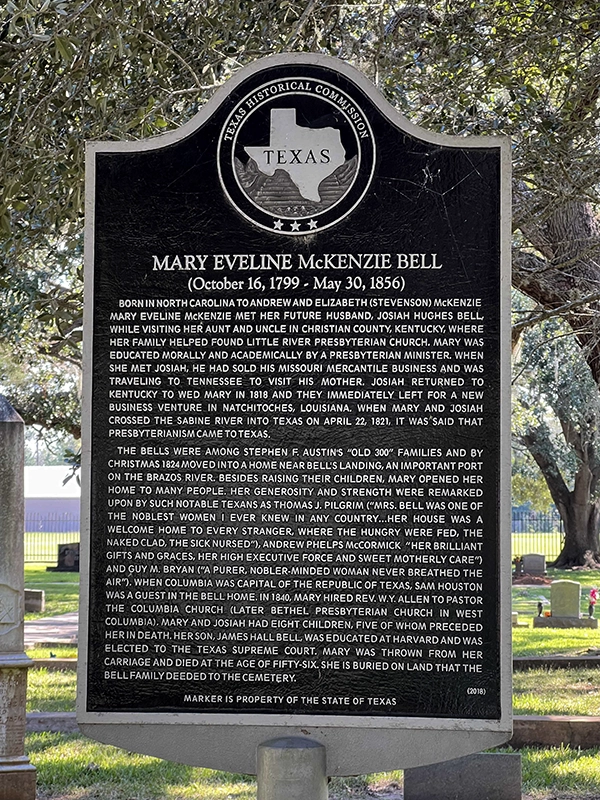

(1799 – 1856)
The old adage that “behind every good man is a good woman” may have been begun by pioneer men and woman who saw Mary Bell in action. Despite having been born into a wealthy lifestyle, Mary McKenzie Bell faithfully supported the efforts and desires of her husband, Josiah Hughes Bell. Leaving the comforts of her family’s lifestyle, she agreed to move to the wilds of Texas. Her early marriage was fraught with hunger, childbirth; and less than comfortable surroundings; however, she provided comfort for her husband and her children. In addition, Mary Bell provided for the poor, helpless and ill of Austin’s colony. Although her faith was tempted many times, she stood firm in her resolve to serve the Lord wherever needed. She was truly a godly example in the wilderness. Men such as Thomas J. Pilgrim and Sam Houston praised Mary Bell for her compassion and Christian spirit.
Mary Eveline McKenzie was born October 16, 1799, near Statesville, North Carolina, the first born of well-to-do parents[i], Andrew McKenzie and Elizabeth Stevenson. Her parents employed Reverend James Hall, a Presbyterian Doctor of Divinity to educate their daughter morally and academically[ii]. Mary McKenzie was described as a petite, blue eyed beauty with rich auburn hair who excelled in horsemanship and had a clear, joyful voice for singing[iii]. During Mary’s youth, the Stevenson and McCormick side of her family moved to Christian County, Kentucky and were prominent in founding Little River Presbyterian Church. While visiting her uncle, James McCormick, Mary McKenzie met Josiah Bell. Josiah Bell was enroute to Tennessee to visit his mother following a trip to Missouri where he had met Stephen F. Austin. He stopped by Christian County, Kentucky to visit his friend, Andrew McCormick, a senior elder of the Presbyterian Church. Josiah accompanied Mr. and Mrs. McCormick to a congregational singing school. It was there that he was introduced to Mary Eveline McKenzie[iv]. Josiah Bell left Mary in Kentucky, visited his mother in Tennessee and traveled to Natchitoches to enter the mercantile business with a friend. After leaving the fledgling business in the hands of his partner, Josiah Bell travelled back to Kentucky and on December 1, 1818, at the age of nineteen, Mary McKenzie married Josiah Hughes Bell at Little River Presbyterian Church in Christian County, Kentucky[v]. The newly married couple headed west to Natchitoches, Louisiana to tend Josiah’s new business venture.
The mercantile business flourished[vi]. On October 10, 1819, Samuel McKenzie Bell was born. On December 22, 1820, Elizabeth Lucinda Bell was born. Josiah discovered that his partner had been stealing from the profitable business and [had] left town. Josiah Bell was forced to close his bankrupt business. With the majority of his worldly goods, he bought a family of slaves, Moses, Rachel and their daughter Malinda, and together they departed Natchitoches[vi].
On·April·22, 1821, the Bells arrived with their slave family, crossed the Sabine River and according to the “History of the Presbyterian Church,” Presbyterianism came to Texas. The Bells entered Texas with six and a quarter cents and their servants.[vii] In Reverend W. Y. Allen’s Reminiscences of Texas 1838-1842 published in the Southwestern Historical Quarterly, Volume XVII, July 1913 to April, 1914, Allen tells how interesting it was to hear of Mrs. Bell “tell of her early trials, self-denials during her early years in Texas, how, for weeks, they were without bread, living upon deer meat, and upon tea, sweetened with honey, and nursing a child at the same time.” In October of 1821, Josiah Bell and Stephen F. Austin meet again in Nacogdoches.
Austin provides Bell with a letter granting Bell “permission is hereby granted to Josiah H. Bell to settle on the grant made to my father in this Province. He is to receive nine hundred and sixty acres as head of his family and in addition to that three hundred and twenty acres for his wife and one hundred and sixty acres for each child and slave. One half of which is to be taken in an oblong on the [Brazos] River and the other half back from the river…”[viii]. In addition, Austin, recognizing the value of his friendship with Bell, asked Bell to serve as the alcalde for the colony. Bell left his wife and two children at Mound Prairie, and he and his slave family proceeded to New Year’s Creek in Washington County and built a home for his family. Soon after Mary and the children joined them. On October 4, 1822, a second son Thaddeus Constantine Bell was born, the first male child born in Austin’s colony[ix].
As one of the first settlers in the colony, Bell was allowed to select property prior to most of the other colonists. He selected a league of land that ran along the norther bank of the Brazos River and an adjoining half league that included a prairie between the Brazos and Colorado Rivers. His land included an area along the widest and deepest part of the Brazos River, navigable in all seasons. He called it “Marion”. However, others called it Bell’s Landing. It became an important port in early Texas. In the summer of 1824, the Bell family and slaves moved from Washington County to Bell’s selected site. He used proceeds from the sale of his Washington County property and possessions to purchase more slaves. They pitched a tent under large live oak trees and began building a home[x]. Thus began a period of self-preservation and denial that Mary Bell described later to the Reverend Allen. Bell completed the building of his “good dwelling house” just in time for Christmas of 1824[xi]. On January 21, 1825, James Hall Bell was born. James Hall Bell was educated at Harvard and became a prominent lawyer. In 1856 he was elected Judge of his native district. At the age of thirty-three, he was elected to the Supreme Court of Texas[xii].
By 1826 Bell had cut a road west toward the prairie and established the town of Columbia (West Columbia). While he was establishing the town, he built a new home under a grove of large, live oak trees to provide shade. The house was a double log house with two rooms separated by an open space and a roof covering both rooms. Between the two halves, a hall served as a dining room and reception hall. The property included sheds, blacksmith shop, smokehouse, kitchen and slave quarters[xiii]. The family moved in 1827, and on February 24, 1828, William Washington Bell was born. It was in this home that Mary Bell gained a reputation as a gracious hostess to all who entered the home.
Josiah Bell built a hotel in Columbia as well as provided a school for children from nearby settlements. He hired Thomas J. Pilgrim as the teacher. Pilgrim, who became known as the Father of Texas Sunday Schools and founder of Austin and Houston Academies, summarized the life of Mary Bell:
“Mrs. Bell was one of the noblest women I ever knew in any country; though living in the wilds of Texas, her intelligence, good taste, and polished manners would have graced the most refined circles of New York or Philadelphia. He[r] house was welcome home to every stranger, where the hungry were fed, the naked dad, the sick nursed with that tenderness and sympathy which removed many a dark cloud from the brow of sorrow and caused the lonely wanderers to feel less acutely the absence of home and relatives. Texans now know very little how much the country owes to the early efforts of this pure woman, how much suffering she was instrumental in relieving, and, when the dark clouds of war lowered, which confidence and courage she inspired in the bosoms of the timorous and desponding: for she was a stranger to fear, and of our final success she never doubted.”[xiv]
Kincannon, Laurie Beal (October 2020) Narrative for Texas State Historical Commission Application for Historical Marker for Mary Eveline McKinzie Bell
[i] Brazoria County History Museum file
[ii] Brazoria County Historical Library File 47, “Mary Eveline McKenzie Bell: The Good Samaritan of Austin’s Colony”. Godly Women of Virtue 8:3
[iii] McCormick, Andrew, “Scotch-Irish in Ireland and in America” p70
[iv] McCormick, Andrew, “Scotch-Irish in Ireland and in America” p71
[v] Brazoria County Historical Library File 47, “Mary Eveline McKenzie Bell: The Good Samaritan of Austin’s Colony”. Godly Women of Virtue 8:3
[vi] McCormick, Andrew, “Scotch-Irish in Ireland and in America” p72
[vii] Brazoria County History Museum file
[viii] Barker, Eugene C., (1924-1928) “The Austin Papers”, Volume 2, parts 1 & 2, p416-417
[ix] McCormick, Andrew, “Scotch-Irish in Ireland and in America” p75
[x] McCormick, Andrew, “Scotch-Irish in Ireland and in America” p77
[xi] Creighton, James A. (1975) A Narrative History of Brazoria County, Brazoria County Historical Commission
[xii] Brooks, Elizabeth, (1896) Prominent Women of Texas, Werner Company, p42
[xiii] McCormick, Andrew, “Scotch-Irish in Ireland and in America” p105
[xiv] “History of the Presbyterian Church in Texas” Sec IV, p3
